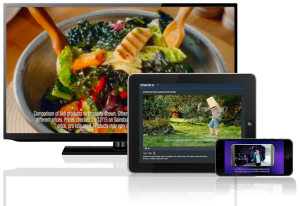
After more than 40 years of operation, DTVE is closing its doors and our website will no longer be updated daily. Thank you for all of your support.
RTL’s ad-tech ambitions
RTL’s acquisition last week of server-side ad insertion (SSAI) company, Yospace, marks its latest investment in the ad-tech space and is an important move in the context of its ambitious wider digital strategy.
 Announcing the deal, RTL said that Yospace would complement its current ad-tech stack, at the heart of which lies SpotX – an online video advertising platform that powers programmatic video across different screens.
Announcing the deal, RTL said that Yospace would complement its current ad-tech stack, at the heart of which lies SpotX – an online video advertising platform that powers programmatic video across different screens.
Speaking exclusively to DTVE after the US$33 million (€29 million) RTL takeover was confirmed, Yospace CEO Tim Sewell explains that the two firms had been in dialogue for around 18 months.
“We’ve been working closely with SpotX on a number of mutual clients for some time and have also been in discussion with various parts of the RTL Group as potential customers for our SSAI solution,” he says.
“At a point in time, those conversations moved more to one of potential corporate transaction with a view that what Yospace has developed is very complimentary both with the RTL Group strategy, but also with RTL’s other investments in the space around addressable TV and programmatic.”
The deal means RTL now owns companies that handle both programmatic ad monetisation and ad delivery technologies, though Sewell stresses that Yospace will remain programmatic-platform agnostic.
Yospace’s aim is to make SSAI technology as efficient as possible in delivering a TV-like experience in a programmatic world, and it will continue to run as a standalone company with the same offices and management team.
“Our focus is very much around becoming the de facto standard for server-side ad insertion, and that’s within RTL Group as well as the wider global marketplace,” says Sewell.
“We have the full commitment [from RTL] to continue servicing our existing customers and expanding our customer footprint over the next couple of years. Obviously, with the RTL transaction, it does open up a significant new opportunity for Yospace in terms of RTL’s broadcast businesses, but those are businesses that we were in discussions with prior to the transaction.”
“RTL have bought into Yospace’s existing strategy, so it’s a plan that Yospace has had in place for the coming years that I think was attractive to RTL.”
Along with growing its footprint, Yospace also aims to support different use-cases. Sewell says that while many customers work with the company on ad insertion into live-streams, they are also starting to see the benefits of SSAI technology for video-on-demand – particularly with the support of SpotX’s programmatic capabilities. Additionally, the company is working to support different user experiences, for example shortening ad breaks when a user is streaming to their mobile phone to avoid ‘ad fatigue’.
For RTL, the Yospace deal comes more than a year after it announced it was buying the 36.4% of SpotX that it did not already own for US$145 million. The deal closed in October 2017, though RTL first acquired a majority stake in SpotX in September 2014 when the company was known as SpotXchange.
In November 2017, RTL unveiled plans to combine SpotX and sister RTL Group company, Smartclip, into a single integrated ad-tech company by the end of 2018. The broadcaster said it would roll the combined platform out across its operations and boost it with further acquisitions.
The strategy was to focus on ad-server development, addressable TV, and dynamic ad-insertion while collaborating with VideoAmp and Clypd – US-based companies that RTL took minority 18.9% and 17% stakes in respectively in 2015. VideoAmp offered RTL a platform for cross-screen data optimisation while Clypd’s focus was programmatic advertising sales on linear TV.
Since laying this digital ad groundwork, RTL’s ‘Total Video’ strategy has taken shape and is the driving force behind much change at the corporation.
In December RTL set out its plans for 2019, announcing that it would expand its video-on-demand services by developing a joint VOD tech platform that all its streaming platforms and broadcaster video-on-demand services will ultimately migrate to. It also said it would make “significant investments” in more local and exclusive content.
RTL’s focus on a digital future is already becoming apparent. In December, RTL Group’s domestic German arm, Mediengruppe RTL Deutschland, revamped its OTT TV service TV Now with a range of new, exclusive shows, live content and popular German and US series in a new premium package priced at €4.99.
Meanwhile, at the start of this month, RTL moved to combine its Divimove and UFA X units into a single short-form video division. The new unit is designed to be an integrated powerhouse for the production, aggregation and monetisation of short-form video content in Europe.
With a firm footing in the ad tech space, it is clear that RTL is not only betting on the future of content distribution but is also making sure it is well placed to benefit financially from these changing viewing habits.


